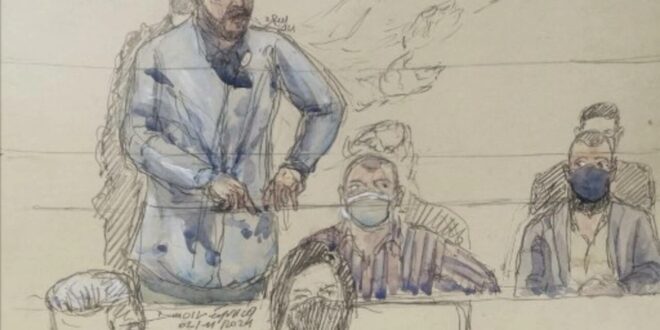The Paris attacks trial resumed on Tuesday with police evidence from Brussels on the background and Syrian activities of Mohamed Abrini. Abrini did not hear what was said about him, since he is one of five accused who continue to boycott the trial in protest against Belgian police witnesses being allowed testify by videolink from Brussels.
Mohamed Abrini visited Syria in the summer of 2015. On his way back to Belgium, Abrini made a detour via London, Manchester and Birmingham. He also stopped in Paris. No one knows why.
He certainly collected money from two Islamic State supporters based in England. Two men are in jail in the UK for their part in helping to finance a terrorist organisation. But the amount the pair gave him . . . Abrini claims it was the sterling equivalent of 3,800 euros . . . seems paltry in relation to the organisation’s vast funds, especially since Abrini himself had been advanced 2,000 US dollars to finance the trip.
In England, he visited Manchester United’s ground at Old Trafford, taking a selfie. Belgian police believe that he was anxious to give himself an alibi to disguise his Syrian visit. But he hardly needed to go to Manchester for that.
The French anti-terrorist authorities suspect that he was looking for a target for a projected attack. Old Trafford has a capacity of 76,000.
Contradictory indications
Nothing about the man is clear.
In police interviews before his departure for Syria, Mohamed Abrini repeatedly denied any sympathy for radical Islam.
Yet he was close to IS terrorist organiser Abdelhamid Abaaoud and to the Abdelsam brothers. He attended the Luqman mosque in Molenbeek, a known source of radical islamist preaching. He was part of the group associated with cafés in Brussels where Islamic State propaganda videos were frequently viewed.
Friends and relatives interviewed in Belgium say Abrini shifted to a jihadist position in 2014. In September that year, he was released from Forest prison outside Brussels where he was serving time for petty gangsterism, and began to show signs of radicalisation.
Clear signs of fundamental shift
The death of his younger brother, Souleimane, who was killed in August 2014 fighting for Islamic State in Syria, seems to have been a powerful motivation.
Mohamed Abrini dressed differently, showed a renewed interest in the Coran, and threatened to murder his girlfriend if she went out without wearing the full-body niqab.
He started to plan his own departure for the Syrian war zone.
In fact, his stay in Syria appears to have been a brief one. According to Abrini’s own account, he spent no more than nine days in the IS stronghold of Raqqa. He visited his brother’s grave, had several meetings with Abdelhamid Abaaoud, and left for London with two English phone numbers provided by Abaaoud.
Those contacts led to the cash collection in Birmingham.
Interviewed by Belgian police on his return, Abrini continued to deny any link with or sympathy for islamic jihad.
He was seen with the Abdeslam brothers the day before the Paris attacks. And he is believed to have failed to detonate a suitcase bomb in Brussels’ Zaventem airport in the March, 2016 attack which killed 32 people.
The trial continues.
 Eurasia Press & News
Eurasia Press & News




